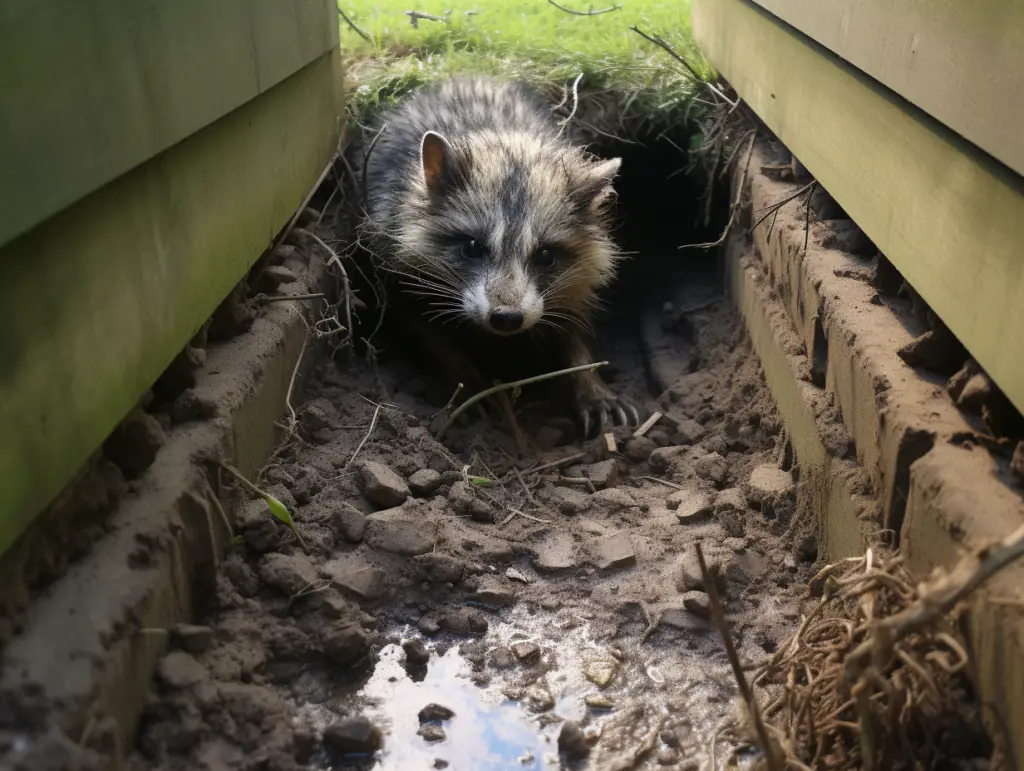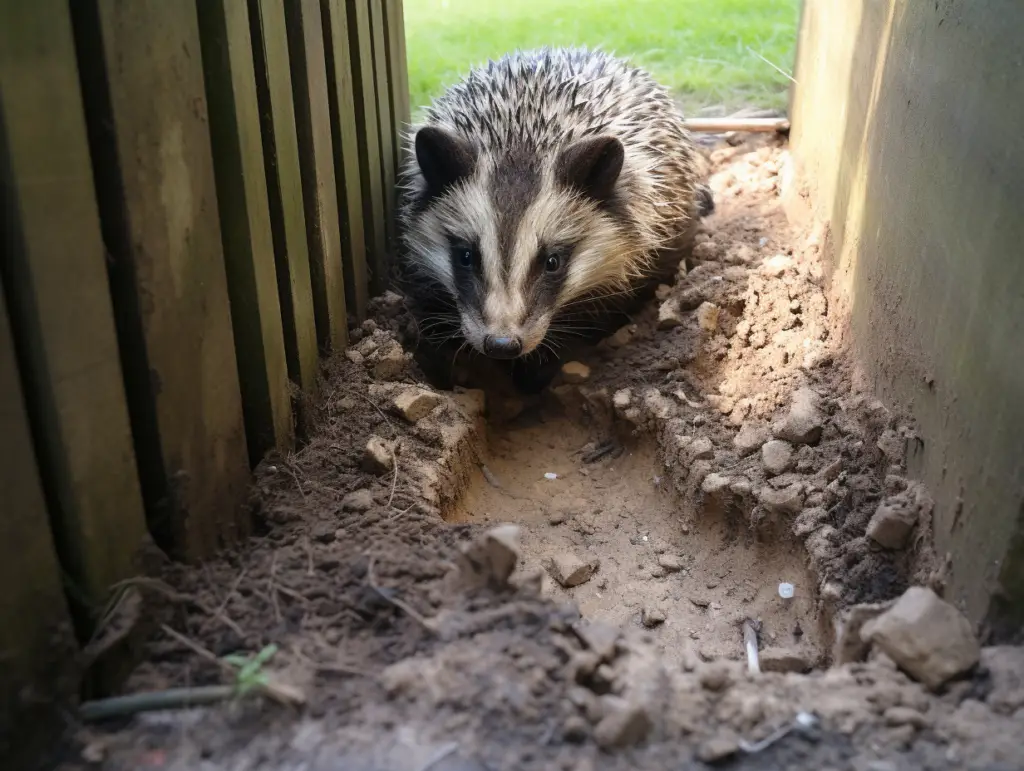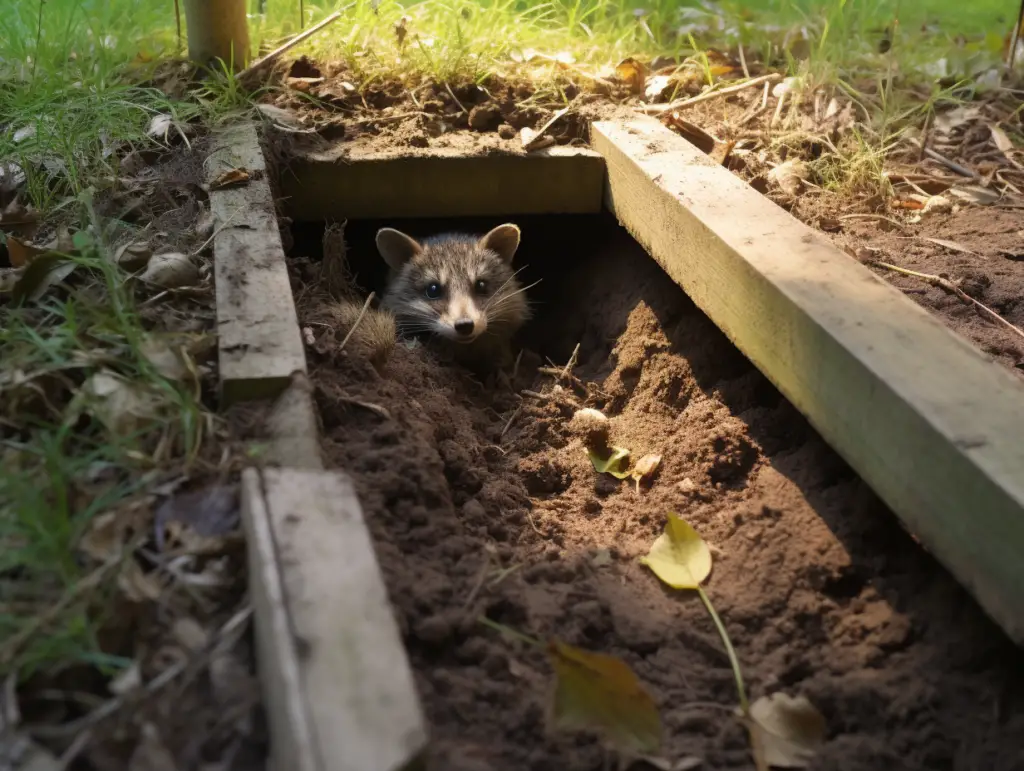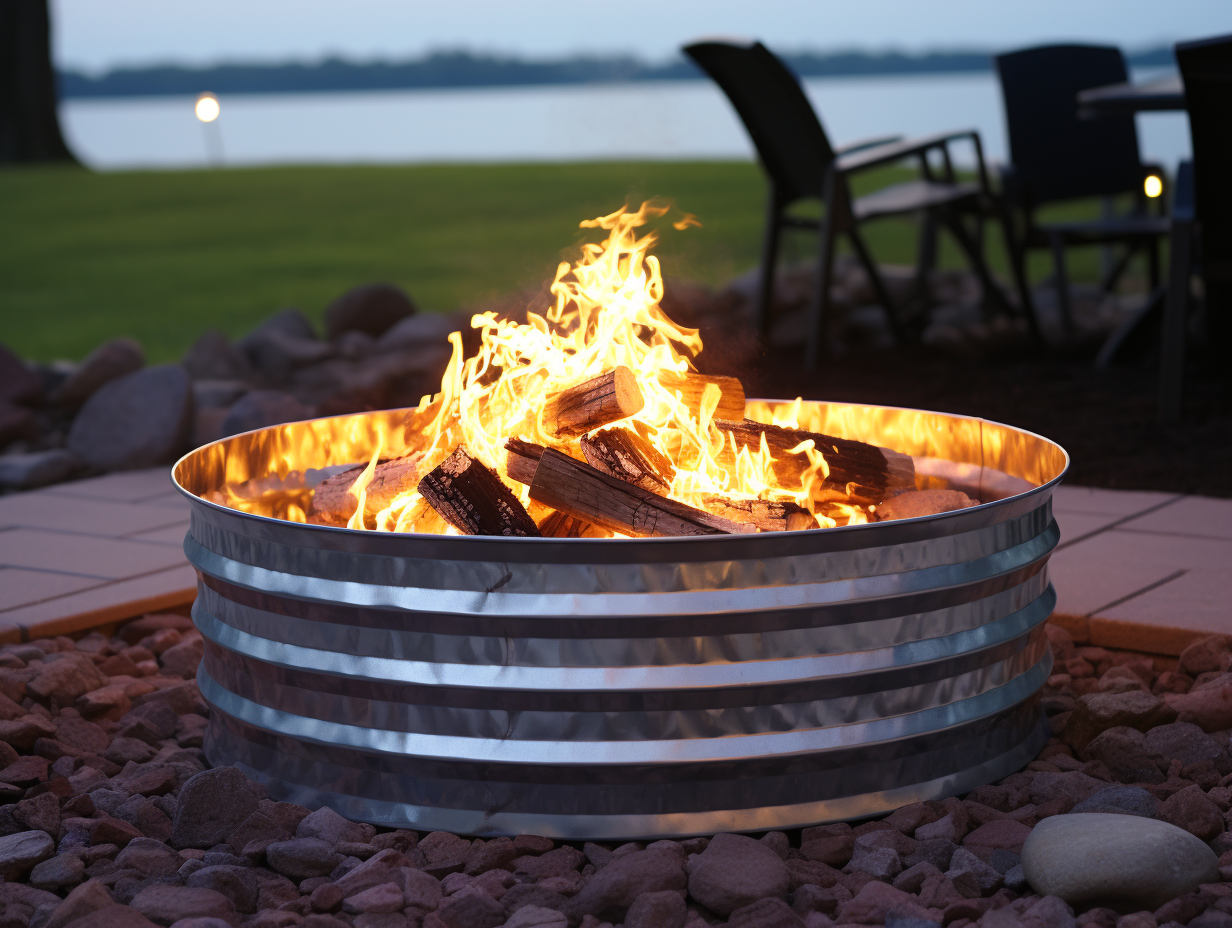Skunks are cute and fascinating creatures, but they can be a nuisance when they take up residence under your shed. Not only can they dig up your lawn and garden, but they can also spray a foul-smelling liquid when they feel threatened.
If you’re dealing with skunks under your shed, you’re probably wondering how to get rid of them safely and humanely.
Fortunately, there are several ways to get rid of skunks under your shed without harming them. From identifying skunk presence to preventive measures, humane skunk removal, and dealing with skunk odor, this article will provide you with five effective ways to get rid of skunks under your shed.
We’ll also provide tips on how to protect your pets and home and care for baby skunks if you find them. So, let’s get started.

Key Takeaways
- Identifying skunk presence is the first step to getting rid of them safely and humanely.
- Preventive measures such as securing your garbage and eliminating food sources can help keep skunks away.
- Humane skunk removal methods such as using a live trap or installing a motion-activated sprinkler can help you get rid of skunks without harming them.
Understanding Skunks
Skunks are small mammals that are native to North America and Mexico. They are known for their distinctive black and white striped fur and their ability to spray a foul-smelling liquid as a defense mechanism. Skunks are nocturnal creatures, meaning they are most active at night.
Diet
Skunks have a varied diet that includes insects, small mammals, fruits, and vegetables. They are opportunistic feeders and will eat whatever is available to them. Skunks are also known to dig up lawns and gardens in search of grubs and other insects.
Species
There are four species of skunks in North America: the striped skunk, the eastern spotted skunk, the western spotted skunk, and the hooded skunk. The striped skunk is the most common and can be found throughout the United States.
Behavior
Skunks are generally solitary creatures, but they may congregate in groups during the winter months to keep warm. They are not aggressive animals and will only spray as a last resort when they feel threatened. Skunks are also known to release a warning scent before spraying to give potential predators a chance to back off.
In summary, understanding skunks’ behavior, diet, and species is important when trying to get rid of them. It is essential to approach them with caution and avoid any potential threats to avoid being sprayed.
Identifying Skunk Presence
Before you can get rid of skunks under your shed, you need to be sure that they are actually there. Skunks are nocturnal animals, so you may not see them during the day. However, there are some signs that can indicate their presence.
One of the most obvious signs of skunks is their smell. Skunks are known for their strong odor, and if you smell a skunk around your shed, it’s a good indication that they are living there. Skunks also dig holes and burrows, so if you see holes around your shed, it’s possible that skunks are the culprit.
Another sign of skunks is their diet. Skunks are omnivores, and they will eat just about anything. If you have garbage or trash around your shed, it could be attracting skunks. Skunks also like to eat fruits and vegetables, so if you have a garden or lawn near your shed, it’s possible that skunks are feeding on your plants.
If you suspect that skunks are living under your shed, it’s important to act quickly. Skunks can cause damage to your property, and they can also carry diseases. By identifying the signs of skunk presence, you can take the necessary steps to get rid of them and prevent them from coming back.
Preventive Measures

Preventing skunks from making a home under your shed is the best way to avoid the need for removal. Here are some preventive measures you can take:
Eliminate Food Sources
Skunks are attracted to food, so it’s important to eliminate any potential food sources around your shed. This includes securing your garbage cans, feeding pets indoors, and not leaving pet food outside. You should also avoid placing your compost pile near your shed.
Use Repellents
There are several natural repellents you can use to keep skunks away from your shed. Cayenne pepper, apple cider vinegar, and citrus peels are all effective at repelling skunks. You can also try using peppermint oil or castor oil around the perimeter of your shed.
Install Bright Lights
Skunks are nocturnal creatures, so installing bright lights around your shed can help deter them. Motion-activated lights are particularly effective at scaring skunks away.
Seal Off Burrows
If you notice a skunk burrow near your shed, it’s important to seal it off. Use steel mesh or wire mesh to cover the entrance and prevent skunks from getting inside.
Install an Exclusion Barrier
If skunks continue to be a problem, consider installing an exclusion barrier around your shed. This can be done using wire mesh or steel mesh and will prevent skunks from getting underneath your shed.
By taking these preventive measures, you can reduce the likelihood of skunks making a home under your shed. If skunks do become a problem, be sure to handle them in a non-aggressive manner using cage traps or other humane removal methods.
Humane Skunk Removal
When it comes to getting rid of skunks under your shed, there are humane ways to do it. It’s important to remember that skunks are living creatures and should be treated humanely. Here are some ways to remove skunks from under your shed without harming them:
1. Locate the Skunk
The first step in humane skunk removal is to locate the skunk. You can do this by looking for signs of activity around the shed, such as paw prints or droppings. Once you have located the skunk, you can proceed with the removal process.
2. Use a Cage Trap
One of the most effective ways to remove skunks from under your shed is to use a cage trap. A cage trap is a humane way to catch the skunk without harming it. Simply place the trap near the entrance of the shed and bait it with food that skunks like, such as peanut butter or sardines. Once the skunk enters the trap, it will trigger the door to close, trapping the skunk inside.
3. Contact Animal Control
If you’re not comfortable using a cage trap or if you’re not sure how to remove the skunk, contact your local animal control agency. They have the expertise and equipment to safely remove the skunk without harming it.
4. Release the Skunk
Once you have caught the skunk, it’s important to release it in a safe location away from your property. Choose a wooded area or other natural habitat that is far away from residential areas. Make sure to release the skunk during the day, when it’s less likely to encounter predators.
5. Prevent Future Infestations
To prevent future skunk infestations, take steps to make your property less attractive to skunks. Keep garbage cans tightly sealed and remove any sources of food, such as pet food, from outside. Seal any openings around the shed to prevent skunks from entering.
In summary, humane skunk removal involves locating the skunk, using a cage trap, contacting animal control if necessary, releasing the skunk in a safe location, and preventing future infestations. By following these steps, you can safely and humanely remove skunks from under your shed.
Dealing with Skunk Odor

Skunk odor is one of the most unpleasant and overpowering smells you can experience. If you have a skunk living under your shed, it’s only a matter of time before the smell becomes unbearable. Fortunately, there are several ways to get rid of skunk odor, ranging from natural remedies to harsh chemicals.
Natural Remedies
One of the most popular natural remedies for skunk odor is vinegar. Vinegar is known for its ability to neutralize odors, and it can be used to remove the smell of skunk spray from a variety of surfaces. To use vinegar to get rid of skunk odor, mix equal parts vinegar and water in a spray bottle and spray the affected area. Let the solution sit for a few minutes before wiping it away with a clean cloth.
Another natural remedy for skunk odor is citrus. Citrus fruits contain natural oils that can help to mask the smell of skunk spray. To use citrus to get rid of skunk odor, cut a lemon or lime in half and rub it on the affected area. Alternatively, you can use citrus-scented cleaning products to help mask the smell of skunk spray.
Harsh Chemicals
If natural remedies don’t work, you may need to turn to harsh chemicals to get rid of skunk odor. One of the most effective chemicals for removing skunk odor is neutroleum alpha. Neutroleum alpha is a chemical compound that is specifically designed to neutralize the odor of skunk spray. It can be found in many over-the-counter skunk odor removal products.
Another harsh chemical that can be used to get rid of skunk odor is bleach. Bleach is a powerful disinfectant that can kill the bacteria that cause skunk odor. However, bleach should be used with caution, as it can damage some surfaces and can be harmful if ingested.
Protecting Your Pets and Home
Skunks can cause serious problems for pets and homes. They can spray pets and people with a foul-smelling liquid that can cause temporary blindness and other health problems. In addition, skunks can damage your home by burrowing under sheds, decks, and other structures. Here are some ways to protect your pets and home from skunks.
Keep Your Pets Indoors
One of the easiest ways to protect your pets from skunks is to keep them indoors. This is especially important at night when skunks are most active. If you have a cat or dog that spends time outside, make sure to bring them indoors at night. This will not only protect them from skunks but also from other predators like coyotes and raccoons.
Secure Your Garbage
Skunks are attracted to areas where they can find food sources. Make sure to secure your garbage cans with tight-fitting lids to prevent skunks from accessing them. Also, avoid leaving pet food outside overnight, as this can also attract skunks.
Seal Off Access Points
Skunks can burrow under sheds and other structures to create dens. To prevent this, it’s important to seal off any access points. Use wire mesh or other materials to block off any openings under sheds or decks. This will also prevent other animals from using these areas as dens.
Use Skunk Deterrents
There are several skunk deterrents that you can use to keep skunks away from your home. One effective method is to sprinkle citrus peels around the skunks’ favorite places, such as den entrances and feeding areas. You can also use motion-activated sprinklers or lights to scare skunks away.
Call a Professional
If you have a persistent skunk problem, it’s best to call a professional wildlife removal service. They can safely and humanely remove skunks from your property and help you prevent future infestations.
By following these tips, you can protect your pets and home from skunks. Keep your pets indoors, secure your garbage, seal off access points, use skunk deterrents, and call a professional if necessary. With a little effort, you can keep skunks at bay and enjoy a skunk-free home.
Caring for Baby Skunks
If you come across a baby skunk that seems to be sick or injured, it is important to handle the situation with care and caution. Here are some tips on how to care for baby skunks:
Do Not Touch Them
Baby skunks are adorable, but they are still wild animals and can carry diseases. It is important not to touch them with your bare hands. Wear gloves and use a towel or blanket to pick them up and move them.
Contact a Wildlife Rehabilitator
If the baby skunk is sick or injured, contact a wildlife rehabilitator immediately. They are trained to take care of wild animals and will know how to properly care for the baby skunk.
Keep Them Warm
If the baby skunk is cold to the touch, wrap them in a towel or blanket and keep them warm. You can use a heating pad on a low setting or a hot water bottle wrapped in a towel to keep them warm.
Do Not Feed Them
Do not try to feed the baby skunk. They require a specific diet and feeding them the wrong food can harm them. Contact a wildlife rehabilitator for advice on how to properly feed them.
Avoid Using Predator Urine
Some people may recommend using predator urine to keep skunks away. However, this can actually attract skunks to the area. It is best to avoid using predator urine and instead focus on sealing off any entry points to prevent skunks from getting under your shed.
Remember, it is important to handle baby skunks with care and contact a wildlife rehabilitator if they are sick or injured.
Conclusion
Getting rid of skunks under your shed can be a challenging task, but it’s not impossible. By following the tips and methods discussed in this article, you can safely and effectively remove skunks from your property without causing harm to yourself or the animal.
One of the most important things to remember is that prevention is key. By eliminating food sources and securing your property, you can reduce the likelihood of skunks taking up residence under your shed in the first place. Additionally, installing motion-activated sprinklers or using natural repellents like vinegar or ammonia can help deter skunks from entering your property.
If you do find a skunk under your shed, it’s important to handle the situation carefully. Avoid startling or agitating the animal, and never attempt to trap or handle it on your own. Instead, contact a professional wildlife removal service to safely and humanely remove the skunk from your property.
By taking a proactive approach to skunk control and working with experienced professionals, you can keep your property safe and skunk-free for years to come.
Frequently Asked Questions
How to get rid of skunks permanently?
Getting rid of skunks permanently requires identifying and eliminating the factors that attract them in the first place. This includes removing food sources and securing garbage cans, as well as sealing any entry points to your property or shed. You can also use natural repellents, such as vinegar or ammonia, to deter skunks from coming back.
How to use mothballs to get rid of skunks?
Mothballs are not an effective way to get rid of skunks. In fact, using mothballs can be dangerous to both humans and animals, as they contain toxic chemicals that can cause harm when ingested or inhaled. It is best to avoid using mothballs altogether and opt for safer, more humane methods of skunk control.
Do skunks leave their den every night?
Skunks are nocturnal animals, which means they are most active at night. However, they do not necessarily leave their dens every night. Skunks may stay in their dens for several days or even weeks at a time, especially during cold weather or when they are caring for their young.
Signs of skunk under house?
Signs of a skunk under your house may include a strong, unpleasant odor, digging or burrowing around the foundation, and visible droppings or tracks. You may also hear scratching or rustling sounds coming from inside your walls or floorboards.
How to get rid of skunks home remedies?
There are several home remedies that can help deter skunks from your property, including using natural repellents like vinegar, ammonia, or cayenne pepper. You can also try installing motion-activated sprinklers or using bright lights to scare skunks away. However, it is important to note that these methods may not be effective in all situations and may require repeated application to achieve the desired results.
How do you scare skunks away without spraying them?
To scare skunks away without spraying them, you can try making loud noises, such as clapping your hands or banging pots and pans together. You can also use bright lights or motion-activated sprinklers to startle them. However, it is important to approach skunks with caution and avoid getting too close, as they may become defensive and spray if they feel threatened.





Leave a Reply